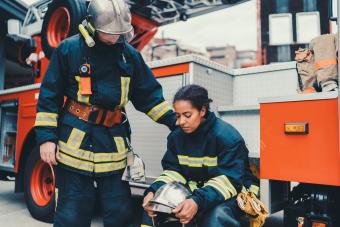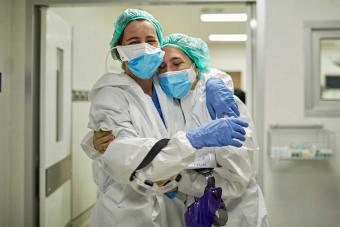
Our mental health is just as important to daily functioning as our physical health. So mental health needs to be prioritized and maintained. Of course, this can become challenging when mental health is impacted by stressful events that are part of a daily routine. Some people are exposed to stress at much higher rates simply because of their jobs.
People who are first responders face intense challenges when they go to work. Often, they have to make life or death decisions repeatedly throughout the day. This constant exposure to stress and trauma can take a toll on mental health, making first responder support services essential to those on the front lines.
Who Are First Responders?
First responders are highly trained experts who arrive first at the site of an emergency and make decisions to manage a traumatic situation. First responders might respond to a natural disaster involving hundreds of people, to a traffic accident involving a small number of people, or to a medical emergency involving just one or two people. Being first on the scene is part of their job description.
Examples of first responders include:
- Emergency Medical Technicians (EMT)
- Firefighters
- Law enforcement officers
- Medical professionals, such as doctors, paramedics, and nurses
The term "first responder" was initially coined in the 1970s as the result of legislation that was developed on the east coast. But the term did not become popularized until the 9/11 attacks in New York City. Since that time, some have embraced the term because it includes all agencies that might respond to an emergency. But others have criticized the term for being vague, stating that it blurs the lines about exactly which agency (fire, police, etc) is responsible for the early response to an emergency.
Mental Health Statistics
First responder mental health statistics are gathered by various organizations to fully understand the impact of stress on the job. These professionals face dangerous and possibly life-threatening situations, are forced to make split-second decisions, and are responsible for the safety and well-being of countless people. They are also exposed to grief, death, and severe injuries. The statistics gathered suggest that they may face mental health challenges at higher rates than other professions.
The Substance Abuse and Mental Health Services Administration (SAMHSA) reports that 30% of first responders develop behavioral health conditions. Nearly one third of people in these professions develop a mental health disorder, such as anxiety, depression, and post-traumatic stress disorder (PTSD). In addition, they also have higher rates of suicidal attempts and ideation.
According to research from the University of Pheonix, 84% of first responders say that they have experienced a traumatic event on the job and 85% have experienced symptoms of mental health issues.
Mental Health Barriers

According to a survey from the University of Phoenix, 93% of first responders agree that mental health is just as important as physical health. Unfortunately, however, 70% of first responders say that mental health resources are never or seldom utilized at their organization. So why is there a barrier to seeking help?
Stigma (such as social shame and disapproval) prevents many people from seeking mental health care. The fear of being labeled 'wrong', 'crazy', or 'disgraceful' can stop some people from seeking help.
According to the University of Phoenix report, 47% of first responders feel that there would be repercussions at their job for seeking professional counseling. Over half of the first responders surveyed stated they were worried about receiving different treatment from coworkers or supervisors if they sought mental health treatment. And 46% of responders said that they feared being perceived as weak by colleagues or peers.
Although first responders are more likely to need mental health support, it can be particularly difficult for them to seek out and receive these services. Many support services include programs to talk to first responders about stigma and the importance of seeking access to mental health care. Many of them are created by individuals that were first responders themselves, or that had loved ones in the field.
First Responder Mental Health Resources
If you or your loved one is a first responder, know that there are several resources dedicated to providing mental health services, education, and training. Some services address the first responder as an individual, but many organizations also offer classes or presentations that can be brought to the workstation to inform the entire team of first responders.
First Responder Support Services
Many organizations offer a wide variety of services, such as retreats, counseling and therapy, and classes on coping strategies. Many also offer resources and classes for mindfulness, meditation, and yoga. Some of them are even tailored to specific first responders and their unique experiences in the profession.
- International Association of Firefighters Recovery Center (IAFFRC)- This behavioral health treatment and recovery center specifically caters to firefighters. They specialize in care for PTSD, trauma, and substance abuse. Their 15-acre center allows firefighters to come together to heal.
- Healing Our Own - As a joint-labor management initiative, this organization is dedicated to increasing the mental and emotional wellness of firefighters. It works to build awareness of the impacts of stress on firefighters, provides peer training and support to teams and fire departments, and teaches prevention and coping strategies.
- Valor for Blue - This officer safety and wellness program is designed for law enforcement officers. It offers a series of videos, podcasts, and a wellness toolkit.
- First Responder Support Network (FRSN) - Provides support and services to first responders and their families. They offer weekly support group meetings, 6-day retreats, strategies to develop coping skills and resilience, basics and advanced peer support training, and online yoga classes.
- First Responders First (FRF) - Located on a ranch, FRF is a rehabilitation facility that provides top-quality mental and physical healthcare specifically designed with first responders in mind. They offer individual, family, and group therapy, along with yoga and meditation classes, and expressive art therapy. They also have programs focused on detoxification and healing from addiction.
- Save A Warrior - This program is dedicated to active and retired military personnel, as well as first responders affected by psychological trauma. Their services center around first responder PTSD. They offer meditation classes and time for people to share and listen to stories of others that have gone through similar situations. They have ropes courses and horses at their facility.
- First Responder Wellness - Provides trauma-informed substance abuse and mental health treatments specifically designed for first responders. They incorporate family systems support, as well as treatment for PTSD, anxiety, and depression.
- Publis Safety Professional Retreat - This 6-day outpatient retreat teaches first responders coping skills to help improve their social and professional relationships. They use prevention and early intervention models to cover a variety of mental health concerns, such as depression, anxiety, and substance abuse.
- 911 At Ease International - Provides free and confidential trauma-informed counseling to first responders and their families. Sessions can be scheduled for virtual or in-person visits.
- 1st Help - This organization connects first responders to organizations in their area that provide mental health resources, peer support options, and even financial aid.
- Responder Strong - Provides a crisis line that allows first responders to text "BADGE" to 741741 to be connected to a crisis counselor. In addition, they provide self-help tools and educational resources.
- First Responder Center - This resource center offers information on how first responders can recognize, accept, and move forward from behavioral health challenges brought on by their jobs. It also provides updates on the latest information on upcoming programs supporting first responders.
- Survive First - This organization aims for all first responders to receive educational information and tools surrounding mental health and wellness. They connect first responders and their families to mental health seminars and classes, as well as host weekly virtual and in-person wellness activities.
- 911 Buddy Check Project - 911 Buddy Check provides peer support, substance abuse coaching, and personal training to all first responders.
Mental Health Hotlines
There are also mental health hotlines for first responders. These can be especially useful for people that are seeking immediate help or that prefer to talk over the phone. Some of these hotlines include:
- Copline: 1-800-267-5463 This resource is a confidential, 24-hour law enforcement officer hotline manned by retired law enforcement officers trained in active listening.
- Fire/EMS Helpline: 1-888-731-FIRE (3473) Confidential and 24-hour, the Fire/EMS Helpline was created for first responders by members of the fire service. This program is specifically designed to meet the unique needs of firefighters, EMTs, rescue personnel, and their families.
- Safe Call Now: (206) 459-3020 or 1-877-230-6060 This confidential, comprehensive, 24-hour crisis referral service is for all public safety employees, all emergency services personnel, and their family members nationwide.
- Crisis Text Line: Text HOME to 741741 from anywhere in the U.S.to connect with a Crisis Counselor.
More Ways for First Responders to Cope
There are also ways for first responders to cope with their mental health concerns on their own while they wait to receive or reach out to treatment providers. These are strategies that first responders can incorporate into their daily life that have been shown to have mental health benefits.
Start a Meditation Practice
Many people have the idea that meditation is an elevated practice that can only be done by highly trained individuals. However, the truth is that anyone can do it. Meditation has been found to reduce symptoms of depression and anxiety, lower blood pressure, and even relieve pain in the body. All of that from just a little breathwork and focus. Some meditations you may want to try are:
Get Some Exercise
Studies have found that regular exercise can reduce stress levels. And, since first responders are exposed to high levels of stress, it can be particularly beneficial. Exercise has also been found to reduce symptoms of anxiety and depression, and even elevate mood levels.
Some first responders get a lot of physical activity when they're on the job, or already find themselves at the gym to maintain their health. If this is your situation, try a different exercise that you enjoy. Maybe you like to take walks in the evenings or want to sign up for a local baseball team. Find something that doesn't feel like a job or work.
Get Enough Sleep
Sleep is important to your mental and physical well-being. Many first responders don't get enough sleep because of the hours they work or are on call. Sleep can improve your brain performance and mood, and is even linked to immune health. In order to get a better night's sleep, you may need to improve your sleep hygiene. This may be difficult, especially for firefighters who rest in between calls during long shifts.
Some ways to improve your sleep are:
- Get at least 30 minutes of natural sunlight a day.
- Skip late afternoon naps.
- Try to avoid screen time before bed.
Find Support

However you are feeling, it can be helpful to develop and lean on a support system. Research shows that peer support can reduce symptoms of depression and anxiety, as well as a person's overall stress levels. When you share your experiences with others, you lighten your mental and emotional burden. Odds are that a lot of your first responder peers have been through similar situations. And, together you can find validation and reassurance when you share your stories.
Some ways to find support include:
- Therapy
- Support groups
- Sharing experiences with co-workers
- Talking to family and loved ones
How Family and Friends Can Help
If you're a family member or friend of a first responder, you may be wondering what you can do to help. Anything you can do to make your loved one feel comfortable and understood would be beneficial.
Be There to Offer Support
Your loved one may turn to you for support when something at work has been particularly stressful. Or, maybe you notice a change in your loved one's behavior after a difficult event at work. If they feel comfortable sharing, listen to them. If they aren't ready to talk about it, that's okay. Meet them where they're at.
Help Them Engage in Healthy Patterns

Even if someone has all the information in the world on healthy eating and good sleep hygiene, it doesn't mean that they'll take advantage of them. One thing you can do to help is to engage in these activities with them. Join them on their evening walk around the block. Or, start to read books before bed instead of watching TV. Everything is easier to do when you have someone to encourage you and hold you accountable. Together, you both can make these changes and support each other along the way.
Talk about Mental Health
For many people, there is still a taboo around mental health. Particularly in environments that require a lot of bravery and strength on a daily basis, such as with first responders. One way to fight the stigma surrounding mental health is to talk about it. Share your own mental health stories and struggles. Talk openly about feeling stressed or down. Let people know that there is no shame or weakness attached to their thoughts or emotions. Emphasize that mental health is just as important as physical health. The more you talk about it, the more you reduce the stigma.
If you're a first responder, you're not alone in the challenges you face. Not only do you have peers and loved ones that want to support you, but you also have networks of first responders that know exactly what you're going through and that have walked in your shoes. Find a program that seems like it would be a good fit for you or your team. They may give you the information you need to save lives in more ways than one.







